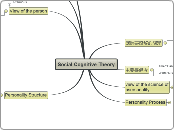Social Cognitive Theory
應該要瞭解的問題
思考或認知歷程,在人格心理學中所扮演的角色
人們如何學習複雜的社會行為
該如何科學地分析一個人personal agency的能力,也就是他們影響自己活動和發展的能力
每個人在行為上的變異,會以什麼樣的方式說明人格的本質
主要提倡者
Albert Bandura
modeling
thinking process
social factor
Walter Mischel
person-situation controversy
view of the science of psersonality
整合心理學內許多領域的知識
強調個別差異
實際應用(practical application)
Personality Process
general theoretical principles
reciprocal determinism
Behavior是受到「行為」、「人格」和「環境」,三者彼此交互作用影響而產生的。
cognitive-affective processing system (CAPS)
三個重要的特徵
認知和情緒的人格變項是彼此複雜地連接的
關注社會情境
不同情境會活化人格系統中不同的人格成分
由於不同的情境會活化不同的人格成分,因此人的行為會隨著情境而有所改變
behavioral signatures
individual's distinctive profiles of situation-behavior relationships
Personality Growth and Development
psychological functions
Observational Learning
(Modeling)
the acquisition of information through the observation of others
acquisition and performance
一個新的行為可以不需要強化物而被學習(learning or acquired);但行為會不會被表現出來(performace)則取決於酬賞或懲罰。
vicarious conditioning
透過觀察他人所學到的情緒反應
Self-Regulation and Motivation
Self-regulation
透過此歷程,人們可以激勵(motivate)自己表現某行為的動機
暗示了人們有能力激勵自己
透過expectations and beliefs, setting goals, self-evaluative, competencies
Slef-efficacy, Goals, and Self-Evaluation Reactions
motivation反映了「目標的有無」和「評價標準」
當對自己的標準和行為表現有落差時,會產生對自我不滿意(self-dissatisfaction),並想要努力提升自己表現
自我效能和自我評價會中介「目標」和「達成目標所做的努力」
當「行為表現」與「自己的標準」有落差時,只有高自我效能者會做更多的努力來達到該目標。
development of intrinsic interest
設立目標(每天背10個單字)
覺得自己能不能達成該目標(slef-efficacy)
做出行為後對自己的評價(self-evaluative)
成功完成目標(每天背10個單字)
自我效能感上升
設立更高的目標
relaxation of effort
沒有達成目標(每天只背8個單字)
自我效能感高者
加倍努力
自我效能感低者
放棄
Self-control and Delay of Gratification
可以透過obsercational learning習得
p330的實驗
Mischel's delay of gratification
能否延遲滿足的關鍵在於「會不會注意到酬賞物」
單字
seminal
(對未來)影響深遠的、有重大意義的
amebale
suitable for a particular type of treatment(可以某種方式處理的)
順從的
plagiarize
抄襲、剽竊
merciful
仁慈的
不幸而可取的
strenuous
費力的、艱苦的
View of the person
What is a pserson
(three qualities)
Focus on person's, and person's unique cognitive capacities
這樣的推理過程反映了推理者本身
可以推理現在、過去和未來的事件
可以透過語言的方式,來對這個世界進行推理
Implication
克服環境影響和動物性的情緒衝動
增加對自己生活的控制感
Personality Structure
Competencies and Skills
Individaul differences may reflect variations in people'sskill in executing different types of action
Competencies
個人解決問題或執行作業以達到目標的能力
thinking about life problems
behavioral skills in executing solutions to life problems
two types of knowledge
declarative knowledge
可以透過文字述說的知識
procedural knowledge
一個人所擁有的認知或行為能力,但無法精確的用文字來述說
Two implications
context specificity
psychological structures that are relevant to some social situations, or contexts, may be irrelevant to others
psychological change
competencies can be acquired through social interation and observation of the social world
Belief and Expectancies
Beliefs
what the world actually is like
Expectancies
what things probably will be like in the future
when forming expectancies, people may group together situations in way that are highly idiosyncratic
a person's expectations may vary from one situation to another
對於酬賞或懲罰的期待(expectation)決定了一個人的行為和情緒,而非酬賞或懲罰本身(environment)
Expectations說明了為何人會在相同情境下做出不同的反應
The self and self-efficacy beliefs
perceived slef-efficacy
一個人認為自己有多少的能力,可以在未來完成特定行為(people's perceptions of their own capabilities for action in future situations)
Assessment
microanalytic research
概念比較
Perceived self-efficacy VS. Self-esteem
Perceived self-efficacy is not a globa varibale
Perceived self-efficacy is not an absract sense of personal worth, but a judgement of what one can do
Self-efficacy expectations VS. Outcome expectations
Outcome expectations 強調做了某行為後,會得到的酬賞或懲罰的信念
Self-efficacy expectations則強調一個人對於能不能執行該行為的信念
Self-efficay and Performance
selection: 自我效能高者會選擇較困難,較具挑戰性的目標
Effory, Persistence, and Performance: 自我效能高者,會盡比多的努力和持續,並且有較好的表現
Emotion: 自我效能高者能夠有比較好的情緒(較少焦慮和憂鬱)完成作業
Coping: 自我效能高者較能因應壓力和沮喪
Goals
what one wants to achieve in the future
a mental representation of the aim of an action or course of actions
近程目標(proximal goal)比遠目標(distal goal)更能影響一個人的行為
人們之所以會做出平常不會做或違反道德的行為是因為disengagement of evaluative standards
involvement的程度越高,disengagement的程度也越高
Evaluative Standard
what things should be like
評估事件好壞的標準
經常引發情緒反應
Slef-evaluative reactions
我們會根據self-evaluation來評價我們的行為,並產生滿意或不滿意的情緒
認為行為是決定於evaluative standards而非environment (和行為主義不同)
